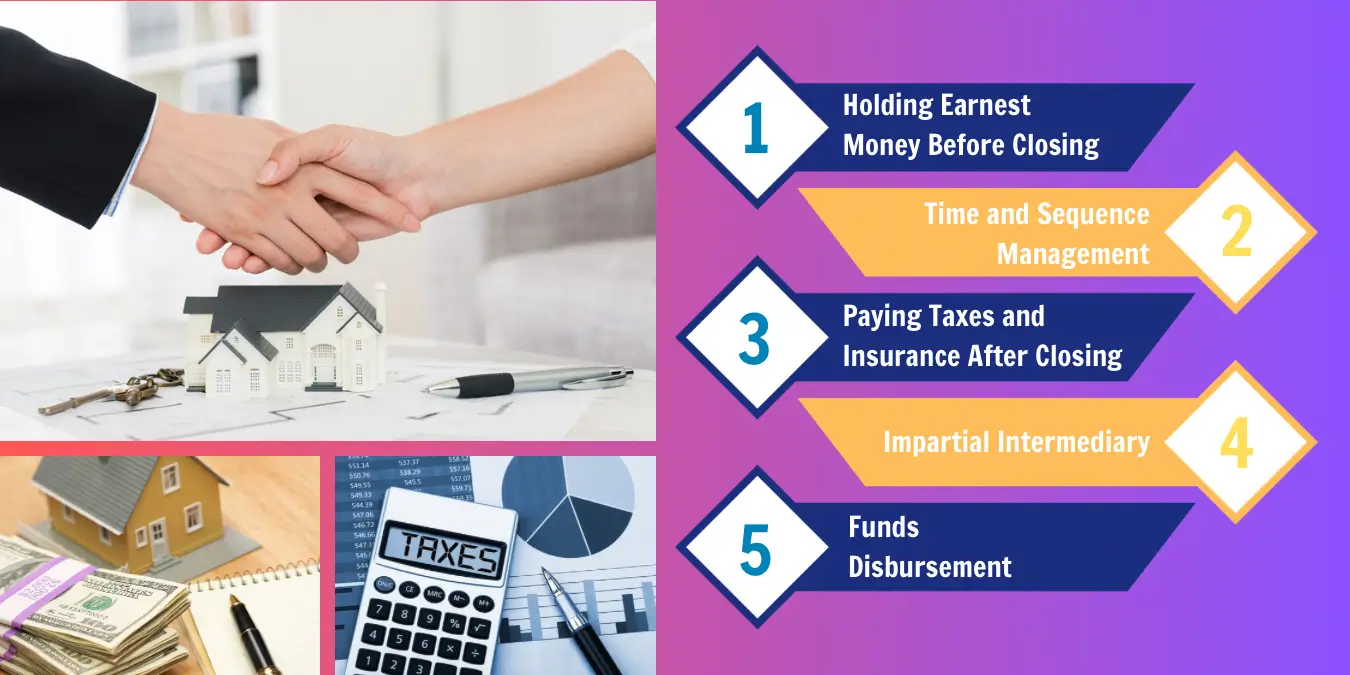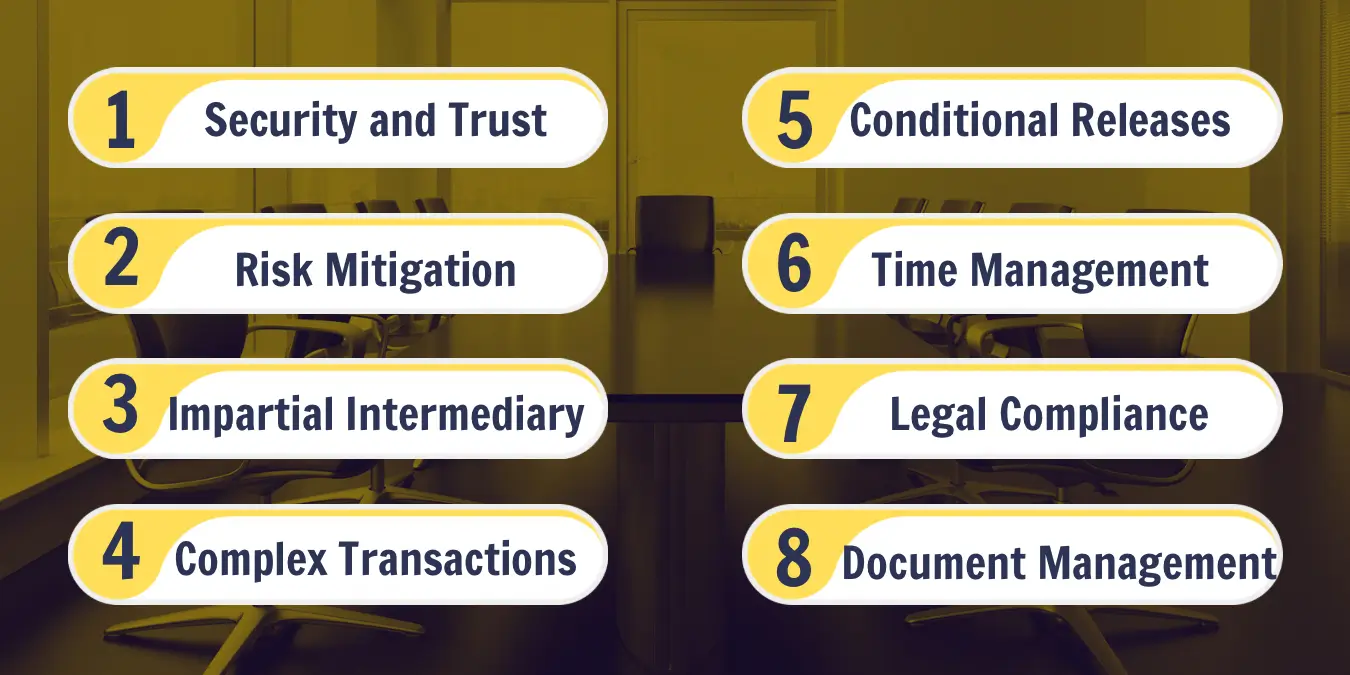

Buying a house and not sure what escrow is? This term, often thrown around in real estate transactions, can seem confusing. Our comprehensive guide will break down the concept of escrow into simple terms, helping you navigate this critical part of buying a home with ease.
Read on! Let’s demystify escrow together.

● Escrow is a process used in real estate transactions where a third party holds onto
money or items until the buyer and seller complete their tasks.
● There are different types of escrow, including real estate escrow, tax and insurance escrow, stock escrow, and online sales escrow.
● Escrow accounts play a crucial role in holding funds before closing on a home and ensuring ongoing obligations like property taxes and insurance payments are paid.
Escrow is a key part of buying a home. It gets used during and after the sale closes. A third party holds onto money or items until the seller and buyer finish their tasks. During the home sale, escrow protects both parties.
The buyer’s good faith deposit goes into an escrow account. This shows the seller that the buyer is serious about buying.
But it does not stop there! After you buy a home, your lender will set up an escrow account too. Each month, part of your mortgage payment goes into this account. This money pays your property tax and homeowners insurance later on in the year.
For all this to work well, someone has to manage these accounts right? That job falls on either escrow agents or companies who do just that! They make sure everything runs smoothly from start to end.

Escrow is a step-by-step process. Here is how it works:
1. Start with the buyer and seller agreeing on the price.
2. The buyer gives good faith money to the escrow company.
3. This money goes into an escrow account.
4. Then, the buyer secures financing for the house.
5. The escrow company checks that no one else claims to own the property.
6. Next, they look at whether there are any unpaid taxes or bills on the property.
7. The buyer then buys hazard insurance for the property.
8. The escrow company can now pay out funds from the escrow account to finalize the
deal.
9. After closing, part of each mortgage payment goes into this account.
10. This helps pay future taxes and insurance costs on time, without worry.
There are several types of escrow, including real estate escrow, tax and insurance escrow, stock escrow, and online sales escrow. Each type serves a different purpose in various transactions.
To learn more about how these different forms of escrow work, click here.

Real estate escrow is a key part of buying a house. It helps to keep your money safe when you start the home-buying process. It also holds onto your tax and insurance money once you own the house.
An escrow company sets up this special account for these funds. The buyer’s good faith deposit, or earnest money, goes here first. After closing, it covers property taxes and homeowners insurance payments from this account too.
So, real estate escrow works as a safety net in real estate transactions.
A tax and insurance escrow is like a piggy bank. The money in it pays for things like property taxes and home insurance costs. Each month, your mortgage payment has a little extra.
This goes into the piggy bank or the escrow account. When these bills come up, the money from this account gets used to pay them off. They cannot be used to repair homes or other homeowner costs, just taxes and insurance.
For some loans you need to have an escrow account but not all of them!
Stock Escrow is a type of escrow used in business. It works as a safety net during stock sales. A company sells its stocks to buyers. The money for these stocks goes into an escrow account.
This account is like a safe place for money. Then, the seller gets this money when they meet all rules of the sale. This way, both sellers and buyers keep their deals fair and safe.
Buying stuff online can feel risky. Online sales escrow makes it safer. It holds your payment until you get the goods. The seller also feels safe because an escrow account proves you have the money to buy.
The best part is, online sales escrow stops frauds in their tracks. How? By making sure both sides play fair and do what they promised. Sellers deliver the goods, well-packed and on time.
Buyers pay up before getting their hands on them!
Escrow accounts play a crucial role in estate transactions by holding funds, such as earnest money, before closing and ensuring that ongoing obligations, like property taxes and insurance payments, are paid after closing.

In the home-buying game, earnest money plays a big part. Earnest money is like a trusted sign between the buyer and seller. The buyer gives this money to show they are serious about buying the house.
This money sits in an escrow account until the deal closes. An escrow agent or company keeps it safe there. It’s not just sitting around though! At closing time, we use this earnest money towards your down payment on the house.
So you see, earnest money helps everyone feel good about moving forward with selling or buying a house.
After closing on a home, you will need to continue paying taxes and insurance. This is where the escrow account comes in handy. With an escrow account, a portion of your monthly mortgage payment is set aside to cover these expenses.
The mortgage lender will collect these funds and make sure they are paid on time, so you don’t have to worry about missing any payments or facing penalties. It’s important to note that the amount required for escrow can change annually based on factors like property reassessment and changes in insurance premiums.
However, having an escrow account simplifies the tax and insurance payments process and provides peace of mind during homeownership.
Escrow accounts offer several benefits, such as providing a neutral third party to hold and distribute funds in a transaction, and ensuring that both parties fulfill their contractual obligations.
However, there are also potential disadvantages, including the additional fees associated with escrow services and the possibility of disputes arising during the process.
Using this account has several benefits. Firstly, it simplifies the payment process for homeowners by allowing them to make one monthly mortgage payment instead of separate escrow payments for property taxes and homeowners insurance premiums.
This helps homeowners budget effectively and ensures that these important expenses are always paid on time. Secondly, an escrow account provides protection for both parties in a real estate transaction.
Buyers can feel confident that their earnest money upfront deposit is held securely until closing, while sellers can trust that funds for property insurance and taxes will be available when needed.

It has some potential disadvantages that you should be aware of. One disadvantage is that having an escrow account can lead to higher monthly mortgage payments. This is because the mortgage lenders collect money for property taxes and homeowners insurance upfront, which adds to your overall monthly escrow payments.
Another potential drawback is that estimates for these expenses may not always be accurate, resulting in either shortages or excess funds in the account. It’s also important to note that escrow accounts do not cover all expenses related to homeownership, such as HOA fees or utility bills, so you’ll still need to budget for those separately.
Additionally, some loans require escrow accounts, so opting out may not be an option unless you meet certain criteria.
Escrow Companies, Escrow Agents, and Mortgage Servicers all play important roles in the escrow process.

Escrow companies are an essential part of the home-buying process. They act as neutral third parties, managing the buyer’s deposit and holding important documents until the transaction is complete.
These companies ensure that funds are available for property taxes and insurance during a real estate transaction, providing peace of mind to both buyers and sellers. Additionally, accounts can be used to hold funds for ongoing expenses such as property tax and homeowners insurance.
This helps homeowners budget for these annual bills by including them in their monthly mortgage payments. While there may be some disadvantages, like higher the monthly mortgage payment or incorrect estimates leading to shortages or excess funds, having an escrow account can simplify the escrow payments process and provide financial stability throughout homeownership.
Escrow agent plays a vital role in estate transactions. They are responsible for managing the buyer’s deposit and handling important documents related to the sale. These agents ensure that funds are available for property tax payments and insurance after closing.
Once the transaction is complete, mortgage servicers take over the escrow account, collecting monthly mortgage payments and overseeing fund management. Whether or not to have an escrow account depends on factors such as mortgage loan type and the borrower’s financial profile.
Mortgage servicers are important players in the escrow process after closing a home purchase. They have the responsibility of collecting mortgage payments from homeowners and managing the funds in the mortgage escrow accounts.
Mortgage servicers are one of several third parties involved in handling escrow accounts, along with escrow companies and agents. Whether or not you need an escrow account depends on your loan type and financial situation, as some loans require it.
Additionally, mortgage servicers also manage the escrow funds for property taxes and homeowners insurance after buying a home.

Escrow fees are charges that you may encounter when going through the escrow process, particularly in home sales. Typically, these fees are around 1% of the purchase price of the property.
It’s important to note that these fees can vary based on different factors, such as location and specific transaction details.
When you’re buying a home and using escrow accounts, there are certain costs involved in managing that account. These costs cover services provided by the escrow agent who handles the funds during the transaction.
The exact amount of these fees will depend on your financial agreement with the escrow agent or company.
It’s essential to understand that while some mortgage escrow account lenders require borrowers to set up an account for their insurance and taxes payments, others might allow homeowners to waive this requirement for a fee.
This means you could choose not to have an escrow account but would need to pay any tax bills or homeowners insurance premiums directly yourself.
Ultimately, understanding and being aware of any potential escrow cost is crucial when navigating through real estate transactions.
What is an escrow balance and how does it work?